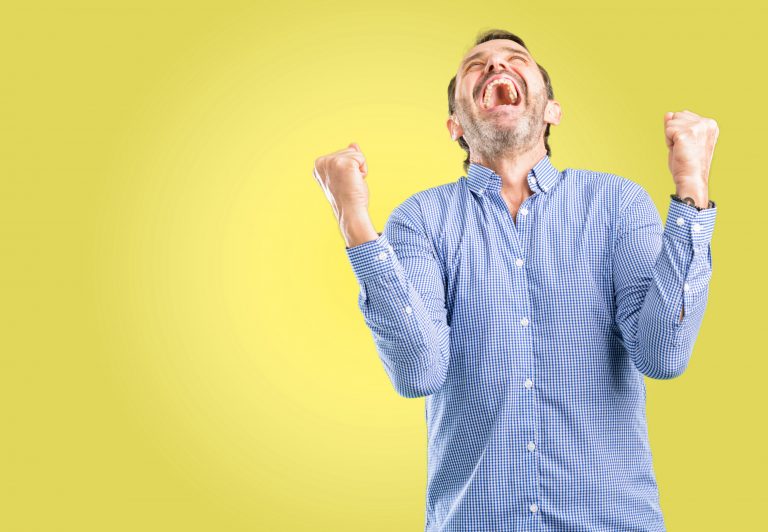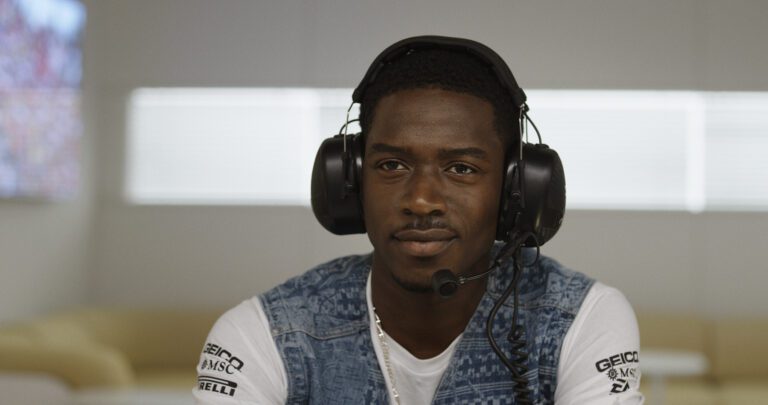When you’re watching The Morning Show on Apple TV+, it’s hard not to get swept up in all the star power sent your way. Jennifer Aniston. Reese Witherspoon. Steve Carell. And that’s before we even get into the nuanced performances by seasoned vets Billy Crudup and Mark Duplass.
But there’s another star in that mix — an actor who may not get as much acclaim, but still deserves a mention for his notable performance: Desean Terry. As highly ambitious Morning Show co-anchor Daniel Henderson, Terry’s character got put through the wringer in season one, falling prey to politics, ego, and a power structure that left him as “collateral damage” in the Alex Levy/Bradley Jackson plot to expose the toxic culture at parent company UBA.
With season two only a few episodes in, Daniel is about to find himself face-to-face with the story he’s been tracking on the development of something called a “novel coronavirus.” (Maybe you’ve heard of it?) While the veteran TV/theater actor and Juilliard graduate has already delivered several memorable moments in his portrayal as Henderson, the character is once again at the precipice of something big that’s brewing. The result is sure to be a juicy, drama-filled second season taking place smack dab amid the shitshow we all know as 2020.
I got a chance to connect with the affable Terry by phone to chat about a slew of topics — from his kinship to the role of Daniel to his feelings about the challenges facing Black actors today.
Here’s what he had to say.
I just rewatched your scenes from episode two of The Morning Show. Between the sarcasm of your line “wouldn’t miss it” and your thoroughly unimpressed look on the plane to China, I’d say you’re making the most of every moment you get on that show.
I love when I’m able to get in a good eye roll.
I was rifling through your IMDB and saw just how long you’ve been a working actor. We see it frequently: you discover an actor in a project you love — and then realize they’ve been at it for 15+ years, having been in 25+ other shows. What would you call your “big break?”
For me, I think most people would say The Morning Show is the big break and definitely in some sense, logistically it is. But for me, it’s life and living. My big break is the identification of deciding to be more creative in terms of how I approach the industry. Approaching it from the more soul-fulfilling perspective.
How did you land the role of Daniel Henderson in The Morning Show? What’s your audition story?
It’s kind of funny. When I got the audition for The Morning Show, it was part of this whole breakthrough thing that I’m talking about. I starred more prolifically in my career in theater. I was one of those actors that was making a living — but was doing a substantial amount of theater in Los Angeles. I’d played some of the bigger houses like the Mark Taper and some of the producers of The Morning Show saw me at a show at the Taper, which was pretty cool.
I was just doing a play, not really going out for that much film and TV stuff at the time.
What happened from there?
Vicky Thomas, who I’d seen many times over many years, brings me in for this role that I immediately had a connection to. I said, “Wow, this is a really, really good one for me.”
I did the audition with Vicky and will be completely honest, I did not think it went exceedingly well. I thought, okay, maybe it’s not me… Then, when I got the producer callback, I thought oh wow, they’re opening the door for the next level. At that point, I thought “game on”… I knew it was my role. I went in for the callback, met with Mimi Leder, Kerry Ehrin, and the whole producing team and threw down, fought hard, and gave one of the best auditions of my life.
Were you drawn to the role for a specific reason… or was it, like, look at the people involved with this project, I need to do it.
It wasn’t so much that, to be quite frank and honest. That actually can get distracting. It was more so the description of who this guy is. I felt like it had been a long time since we’d seen someone at that particular intersection on television. Meaning, economically privileged; he has a good deal of money. He talks about his higher education, but still feels passed over. He sees the systemic issues in the workplace. He’s still seeing that, despite all of it, I’m putting in this much effort and know that if I was a different skin color, or if I was straight, that based off the work I’m capable of doing, that I would be further along.
On top of that, he’s a little bit quirky; a little arrogant. I love that mix of things that I interpreted in the role and thought, you know what? I know that guy. I am that guy… I identify with him.
You have a great scene in episode two with Jennifer Aniston (Alex Levy) who comes to you for a mea culpa and you aren’t having it. Can you offer brief context for how you decided to play that scene?
For that particular scene, I really just responded to Jen. I’ve worked in media before, so I love the opportunity for us to keep things a little bit subdued — subtle, rather than completely overt. His argument is very clear in that scene. He’s one of the few people who’s calling Alex Levy out at that point in time. The scene literally starts with him pretty much saying “Fuck you…”
It’s a great opportunity to express a lot of opinion in a really small intimate space. That’s how Mimi saw it as well. It’s definitely one of the more in-depth scenes I’ve had with Jen. When I finished doing that scene, I walked away and had a twinge of excitement. I was like Wow, you just really did a hard punch at America’s Sweetheart. How often will that happen?
The power structure at work that’s blocked Daniel Henderson from advancing on the show potentially mirrors some forces that exist in the real world. How do you feel about the art- imitating-life part?
Seeing things in the world the way Daniel sees it, I do feel that there’s a glass ceiling. I also feel that there is a huge lack of representation [with] Black and dark voices. Not just a race thing. Everyone deserves to see themselves represented on television equally and fairly, so I fully 100 percent identify with what he’s saying, and yeah, I see it in the world constantly. It’s really great to be able to put my talent and care for the world behind those words because I think very much about how Daniel would like to change the world… but with Desean.
As the central character dealing with the coronavirus, did you have to prepare emotionally to hit the rewind button? Is it something you were anxious to tackle as an actor?
For me as a Black person, I always think of it as a dual pandemic. The experience of going through this medical phenomenon and also going through the racial reckoning. For me, the two things are so intertwined. Later in the season, the thing that creates the most emotional impact is about structural racism and systemic racism and how Daniel is approaching it. So, for me, the emotional part was really reconnecting to all these things I’m fighting for with regards to social justice in the world.
Having grown up in South Central (Los Angeles), what barriers do you think still stand in the way of artists looking to break out — especially for those facing adverse circumstances?
It’s so much. There’s a lack of opportunity when there is opportunity; there is a glass ceiling on how we see people’s colors… We also need to see more faces on television. Their souls and humanized expression. There are all kinds of barriers. And also, there’s this huge economic issue. Compared to black households, I think white households have like eight times more income or something like that. All these systemic issues really prevent people from crossing over… It’s seven miles from Hollywood to South Central, but man, it feels like an ocean.
What needs to happen, in your opinion, to make a change?
We’ve got to open up more opportunities; get more training. It doesn’t make any sense that the entertainment industry, being California’s cash crop, makes it this difficult for somebody who grows up seven miles from Hollywood to actually get a seat at the table in this industry.
It’s quite confounding.
I’m sure some of that mindset has informed your work as the Founder/Artistic Director of Collaborative Artists Bloc. Can you share how your work has impacted lives and its mission?
If it wasn’t for some of the artists who poured it back into me as a kid, I would’ve never been able to have someone say to me, “Hey, you have a gift, you have talent — there’s actually a way here for you to make it in the industry.”
Specifically, I’ll mention Wendy Raquel Robinson, a really great actress who’s had a career that’s spanned decades. To literally be able to meet someone who expressed, “You have a gift” and then to see her on television made me feel like it was possible. There are not enough experiences like that… Staying connected to my community is hugely important to me.
As someone who’s trained at Julliard, what would be your best piece of advice to actors who might be doing commercials now — but have aspirations to one day star in their Morning Show?
Someone said to me that your agent and manager, they get “10%” so they should be doing 10 percent of the work.
Here’s another: Let’s say I’m making money doing commercials. That’s amazing, but hopefully, that’s just one avenue of many things, whether it’s voiceover, commercials, or episodic television. Maybe one is easier than the next. Bank that money and use that as the platform to do the rest of the work. For me, I’m using every opportunity I have to utilize that to create more channels and avenues for myself. Some are just harder than others…
That’s really long advice, but hey.













